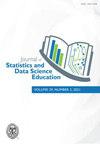Data analytics and programming for linguistics students: A SWOT and survey study
IF 1.6
Q2 EDUCATION, SCIENTIFIC DISCIPLINES
Journal of Statistics and Data Science Education
Pub Date : 2023-10-27
DOI:10.1080/26939169.2023.2276441
引用次数: 0
Abstract
Data analytics and programming skills are increasingly important in the humanities, especially in disciplines like linguistics due to the rapid growth of natural language processing (NLP) technologies. However, attitudes and perceptions of students as novice learners, and the attendant pedagogical implications, remain underexplored. This paper reports a combined SWOT (strengths, weaknesses, opportunities, threats) and survey analysis of how postgraduate linguistics students reflect on internal qualities and external circumstances that affect their learning. SWOT is a popular self-reflective strategic planning tool by organizations. An innovative approach was used to classify students into four SWOT-defined learner dispositions (SO, ST, WO, and WT) based on their relative emphasis on strengths vs. weaknesses, and opportunities vs. threats. Scores on a modified Mathematics Attitude Survey measuring self-rated ABILITY, INTEREST, UTILITY, and PERSONAL GROWTH were then compared across these dispositions. Results reveal i) some unexpected and interesting strengths/weaknesses/opportunities/threats, ii) perceived internal traits (strengths/weaknesses) play a greater role than external traits (opportunities/threats) in shaping students’ attitudes, iii) a paradox where more confident students tend to be less interested, and vice-versa. Pedagogical implications arising from the results are discussed with an eye on enhancing the teaching of data analytics and programming skills to this target population.语言学学生的数据分析和编程:SWOT和调查研究
由于自然语言处理(NLP)技术的快速发展,数据分析和编程技能在人文学科中越来越重要,尤其是在语言学等学科中。然而,学生作为新手学习者的态度和观念,以及随之而来的教学影响,仍未得到充分探讨。本文结合SWOT(优势、劣势、机会、威胁)和调查分析,研究语言学研究生如何反思影响他们学习的内在素质和外部环境。SWOT是一种受组织欢迎的自我反思的战略规划工具。采用一种创新的方法将学生分为四种swot定义的学习者倾向(SO, ST, WO和WT),基于他们相对强调的优势与劣势,机会与威胁。在一项改进的数学态度调查中,测量了自我评定的能力、兴趣、效用和个人成长,然后比较了这些性格的得分。结果显示i)一些意想不到的和有趣的优势/劣势/机会/威胁,ii)感知到的内部特征(优势/劣势)在塑造学生态度方面比外部特征(机会/威胁)发挥更大的作用,iii)一个悖论,即更自信的学生往往不太感兴趣,反之亦然。讨论了从结果中产生的教学意义,着眼于加强对这一目标人群的数据分析和编程技能的教学。
本文章由计算机程序翻译,如有差异,请以英文原文为准。
求助全文
约1分钟内获得全文
求助全文
来源期刊

Journal of Statistics and Data Science Education
EDUCATION, SCIENTIFIC DISCIPLINES-
CiteScore
3.90
自引率
35.30%
发文量
52
审稿时长
12 weeks
 求助内容:
求助内容: 应助结果提醒方式:
应助结果提醒方式:


